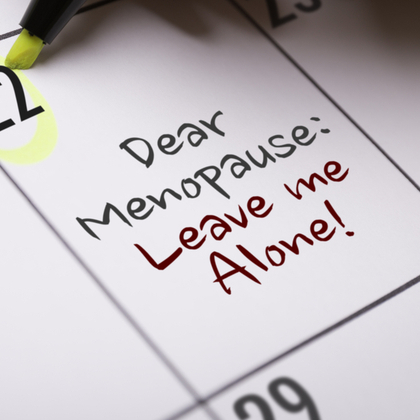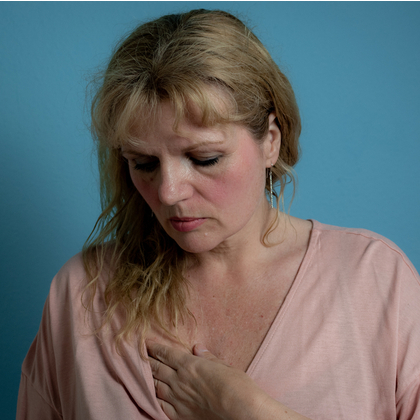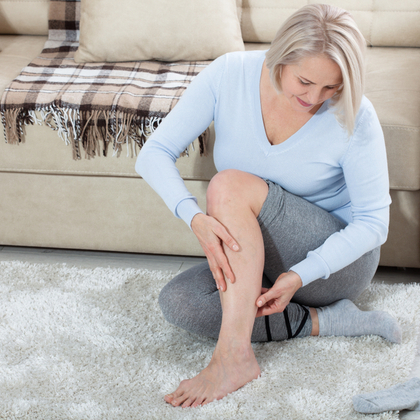
Just like other aspects of female health, there’s no one-size-fits-all experience of menopause. Some women will battle hot flushes and insomnia, while others won’t notice any symptoms at all. Unfortunately, however, more than half of women over 50 will face hair thinning (1).
Dealing with hair loss can be hugely distressing. Hair often holds significance for self-identity and femininity; losing it can affect self-esteem, confidence, and body image (2). Hair loss is also more ‘normalised’ for ageing men, which can make the impact even more devastating for women.
If you’re struggling with menopause hair loss, please know you’re not alone. As we outline below, there are ways to support your hair health as you enter the next chapter of womanhood.
What causes menopause hair loss?
The hormonal fluctuations in menopause – specifically, the decline in oestrogen and progestogen – can lead to changes in hair health. These hormones help hair grow faster and stay on your head for longer. When the hormones start to fall in menopause, hair can become finer, drier, and even shed (3).
Menopause also accelerates collagen loss. Collagen is the fibrous, scaffolding-like structure that provides the main building blocks of connective tissues like skin and hair. Women can lose up to 30% of collagen in the first five years after menopause and an additional 2% each year after (4).
Other causes of hair loss in women over 50
Although menopause is often behind hair loss in women over 50, it’s worth noting that genetics, ageing, stress, nutritional deficiencies, and certain medications can also play a role.
Our expert Nutrition Advisors are available for free, confidential advice, if you have any hair loss concerns.
Best ways to reduce menopause hair loss
Experiencing any hair loss can come as a shock. Fortunately, there are many steps you can take to support your hair health as you transition through menopause.
Nutritional support
Eating a whole food, balanced diet rich in essential nutrients will lay the foundation for healthy, strong hair. Below, we outline some areas to focus on.
Get enough protein
Hair comprises of a structural protein called keratin, which gives it strength and resilience. Without enough dietary protein, your hair can become dry, brittle, and prone to shedding (5).
Including a high-quality source of protein at every meal will help meet your protein needs. Lean meat, tofu, oily fish, dairy products, eggs, legumes (chickpeas, lentils, and black beans), nuts, and seeds are great options.
Collagen
Collagen is a particularly important protein constituent for hair health, supporting its growth and strength (6).
Bone broth is naturally rich in collagen. Studies suggest consuming 300ml of bone broth may increase plasma levels of glycine and proline, amino acids required for collagen production (7).
Collagen supplements can also provide targeted support for hair health. In a randomised, placebo-controlled study on women aged between 39 and 75 years, researchers found those taking bioactive collagen peptides saw an increase in hair thickness after 16 weeks (8).
For additional support throughout menopause, you could try our high-strength collagen supplement, Collagen Beauty®. This formula is derived from porcine collagen and provides VERISOL® Bioactive Collagen Peptides with biotin, vitamin C, and silica in capsule form.
We’ve specifically optimised our Collagen Beauty® to stimulate collagen metabolism and counteract collagen loss that may affect hair health.
Omega 3s
Studies suggest the essential fatty acids in omega 3’s, DHA and EPA, also support hair health, so ensuring a plentiful intake is important (9).
Oily fish, like salmon, mackerel, and anchovies, are amongst the best sources of omega 3s. However, walnuts, chia seeds, and plant-based microalgae contain generous amounts of plant-based healthy fats, too.
If you’re worried about your omega 3 intake, you could take a high-strength fish oil or vegan alternative to cover any shortfalls.
Hair, Skin & Nails Multivitamin
Multi-Max ® Hair, Skin & Nails is a multivitamin formula with 23 nutrients, paying particular attention to those that support hair health. Biotin, zinc, selenium, vitamin C and B vitamins are nutrients renowned for their contribution to the condition of healthy hair and are present at optimal levels.
Iron
Iron plays a crucial role in maintaining healthy hair follicles. Indeed, low iron stores can damage the physiological process of hair follicles, which may lead to hair loss (10).
Animal products, including red meat, poultry, and oily fish, provide highly bioavailable iron, which means the body can absorb it better. Those following vegetarian and plant-based diets can increase their iron stores by upping foods like spinach, lentils, quinoa and tofu.
For menstruating women who experience increased hair shedding, known as Chronic Telogen Effluvium (CTE), we often recommend NutriHair®. This formula provides 20mg iron (as ferrous fumarate) to support normal hair growth in women.
However, as a post-menopausal woman, you only need 8g of iron daily, so NutriHair® isn’t suitable. If you’re looking for supplemental iron, you can find the recommended daily allowance in our specialist multivitamin designed for menopausal women, Multi-Max® Woman 50+.
Vitamin C
Vitamin C doesn't only support iron absorption, it’s also involved in collagen formation, which is essential for hair health (11). You can find vitamin C in citrus fruits, kiwis, spinach, and nutritional supplements.
Zinc
Aside from supporting immune function, zinc is vital for hair. One review reported low zinc stores were associated with higher incidences of hair shedding (12). Good sources of zinc include shellfish, pumpkin seeds, and nutritional supplements.
Selenium
An essential trace mineral, selenium supports the maintenance of normal hair. It also serves as an antioxidant, protecting (hair) cells from oxidative stress, which has been linked to hair loss (13). You can find selenium in Brazil nuts, eggs, fish, chicken, spinach, and nutritional supplements.
Vitamin A
Besides skin health, vitamin A also plays an important role in hair (14). Carrots, pumpkins, sweet potatoes, and nutritional supplements are great choices.
Vitamin E
Vitamin E helps protect (hair) cells from oxidative damage, making it a useful antioxidant for hair health (15). Good sources include almonds, sunflower seeds, pumpkin seeds, and nutritional supplements.
Biotin
One of many powerful B vitamins, biotin supports the maintenance of normal hair, making it essential as you transition through menopause (16). You can find biotin in nuts, seeds, and nutritional supplements.
Vitamin D3
Vitamin D3 plays a crucial role in various bodily functions, including immunity, bone health, and now, it seems, hair health. Research suggests low levels are linked to increased hair shedding in women (17).
The best way to synthesise vitamin D3 is through exposure to direct sunlight. From late March to September, a short burst of direct sunlight can trigger the synthesis of vitamin D3 in your skin. However, this can be challenging during the winter months.
As such, the NHS recommends supplementing with 10µg to plug any nutritional gaps. Additionally, you can find dietary vitamin D3 in egg yolks, oily fish (anchovies, mackerel and sardines) and mushrooms.
Scalp care
It’s not just your hair that needs support; your scalp needs it, too. Proper scalp care is critical for maintaining a healthy environment for hair follicles.
Studies suggest regular scalp massages can improve circulation and stimulate hair follicles (18).
There’s even some research to suggest rosemary essential oil may support hair growth. A 2015 study revealed rosemary essential oil was just as effective as a commonly used hair loss medication (19).
The best way to use rosemary essential oil is by adding five drops to your shampoo and lightly massage it onto your scalp. Leave to soak for five minutes before washing your hair.
Hair care practices
Adopting proper hair care practices can also reduce menopause hair loss. Firstly, try to minimise heat styling and harsh chemical treatments, as these can further damage fragile hair.
Similarly, avoid tight hairstyles like tight buns or ponytails. They can cause traction alopecia, a type of hair loss caused by constant pulling on the hair follicles. Instead, opt for loose ponytails with silk hair bobbles to reduce the risk of breakage.
Finally, when detangling hair, use wide-tooth combs or brushes designed for delicate hair. Start detangling from the ends and work up to the roots to avoid tugging on knots and causing unnecessary stress on the hair strands.
Stress management
Since chronic stress and hair loss are closely related, looking after your mental health is hugely important.
Studies suggest emotional stress can push more hairs into the ‘telogen’ phase, where hair follicles remain dormant and ultimately fall out (20). Moreover, stress and hair loss often have a bidirectional relationship: hair loss can cause stress, which, in turn, can exacerbate hair loss.
Given the psychological distress associated with hair loss, it’s essential to have tools in your arsenal to buffer against stress. Find what works for you – conscious breathing, practising gratitude, or engaging in hobbies that bring you joy and relaxation.
You can read more about supporting your emotional health here.
Self-acceptance
If you’re experiencing menopause hair loss, there can also be great power in practising self-compassion and acceptance. This isn’t always easy. But it can be hugely liberating.
Try to remind yourself that your identity is more than your appearance. Remember, hair loss is a common part of ageing and doesn't define your worth or beauty.
Want to find out more?
Dealing with hair loss after menopause can be challenging, but with patience, perseverance, and lifestyle changes, it's possible to reclaim confidence and support your hair health.
For more information on menopause health, please explore the rest of our dedicated Menopause Hub. Alternatively, contact our team of expert Nutrition Advisors, who are available to provide free, confidential advice on any aspect of menopause.
References:
-
Chaikittisilpa S, Rattanasirisin N, Panchaprateep R, Orprayoon N, Phutrakul P, Suwan A, Jaisamrarn U., Prevalence of female pattern hair loss in postmenopausal women: a cross-sectional study. Menopause. 2022;29(4):415-420.
-
Davis DS, Callender VD., Review of quality of life studies in women with alopecia. International Journal of Women's Dermatology. 2018;4(1):18-22.
-
Chaikittisilpa S, et al.., Prevalence of female pattern hair loss in postmenopausal women. Menopause. 2022;1337-8.
-
Brincat M, et al.. Sex hormones and skin collagen content in postmenopausal women. Br Med J (Clin Res Ed). 1983;287(6402):1337-8.
-
Guo EL, Katta R. Diet and hair loss: effects of nutrient deficiency and supplement use. Dermatol Pract Concept. 2017;7(1):1-10.
-
Martino PA, Heitman N, Rendl M. The dermal sheath: An emerging component of the hair follicle stem cell niche. Experimental Dermatology. 2020;30(4):512–521.
-
Alcock RD, Shaw GC, Tee N, Burke LM. Plasma Amino Acid Concentrations After the Ingestion of Dairy and Collagen Proteins, in Healthy Active Males. Front Nutr. 2019;6:163.
-
Oesser. The oral intake of specific Bioactive Collagen Peptides has a positive effect on hair thickness. Nutrafoods. 2020;1:134-138.
-
Glynis A. A Double-blind, Placebo-controlled Study Evaluating the Efficacy of an Oral Supplement in Women with Self-perceived Thinning Hair. J Clin Aesthet Dermatol. 2012;5(11):28-34.
-
Park SY, Na SY, Kim JH, Cho S, Lee JH. Iron plays a certain role in patterned hair loss. J Korean Med Sci. 2013;28(6):934-8.
-
Almohanna HM, Ahmed AA, Tsatalis JP, Tosti A. The Role of Vitamins and Minerals in Hair Loss: A Review. Dermatol Ther (Heidelb). 2019;9(1):51-70.
-
Almohanna HM, Ahmed AA, Tsatalis JP, Tosti A. The Role of Vitamins and Minerals in Hair Loss: A Review. Dermatol Ther (Heidelb). 2019;9(1):51-70.
-
Guo EL, Katta R. Diet and hair loss: effects of nutrient deficiency and supplement use. Dermatol Pract Concept. 2017;7(1):1-10.
-
VanBuren CA, Everts HB. Vitamin A in Skin and Hair: An Update. Nutrients. 2022;14(14):2952.
-
Beoy LA, Woei WJ, Hay YK. Effects of tocotrienol supplementation on hair growth in human volunteers. Trop Life Sci Res. 2010;21(2):91-9.
-
Glynis A. . A Double-blind, Placebo-controlled Study Evaluating the Efficacy of an Oral Supplement in Women with Self-perceived Thinning Hair. J Clin Aesthet Dermatol. 2012; 5 (11):28-34.
-
Tamer F, Yuksel ME, Karabag Y . Serum ferritin and vitamin D levels should be evaluated in patients with diffuse hair loss prior to treatment. Postepy Dermatol Alergol. 2020; 37(3):407-411.
Banihashemi M, Nahidi Y, Meibodi NT, Jarahi L, Dolatkhah M . Serum Vitamin D3 Level in Patients with Female Pattern Hair Loss. Int J Trichology. 2016; 8(3):116-20. -
Koyama T, Kobayashi K, Hama T, Murakami K, Ogawa R . Standardized Scalp Massage Results in Increased Hair Thickness by Inducing Stretching Forces to Dermal Papilla Cells in the Subcutaneous Tissue. Eplasty. 2016; 16:e8. Available online: https://www.ncbi.nlm.nih.gov/pmc/articles/PMC4740347/
-
Panahi Y, Taghizadeh M, Marzony ET, Sahebkar A . Rosemary oil vs minoxidil 2% for the treatment of androgenetic alopecia: a randomized comparative trial. Skinmed. 2015; 13(1):15-21. Available online: https://www.ncbi.nlm.nih.gov/pubmed/25842469
-
Choi S, Zhang B, Ma S, Gonzalez-Celeiro M, Stein D, Jin X, Kim ST, Kang Y-L, Besnard A, Rezza A, Grisanti L, Buenrostro JD, Rendl M, Nahrendorf M, Sahay A, Hsu Y-C . Corticosterone inhibits GAS6 to govern hair follicle stem-cell quiescence. Nature. 2021.
Disclaimer: The information presented by Nature's Best is for informational purposes only. It is based on scientific studies (human, animal, or in vitro), clinical experience, or traditional usage as cited in each article. The results reported may not necessarily occur in all individuals. Self-treatment is not recommended for life-threatening conditions that require medical treatment under a doctor's care. For many of the conditions discussed, treatment with prescription or over the counter medication is also available. Consult your doctor, practitioner, and/or pharmacist for any health problem and before using any supplements or before making any changes in prescribed medications.
Related Posts

Olivia
Olivia Salter has always been an avid health nut. After graduating from the University of Bristol, she began working for a nutritional consultancy where she discovered her passion for all things wellness-related. There, she executed much of the company’s content marketing strategy and found her niche in health writing, publishing articles in Women’s Health, Mind Body Green, Thrive and Psychologies.
View More



